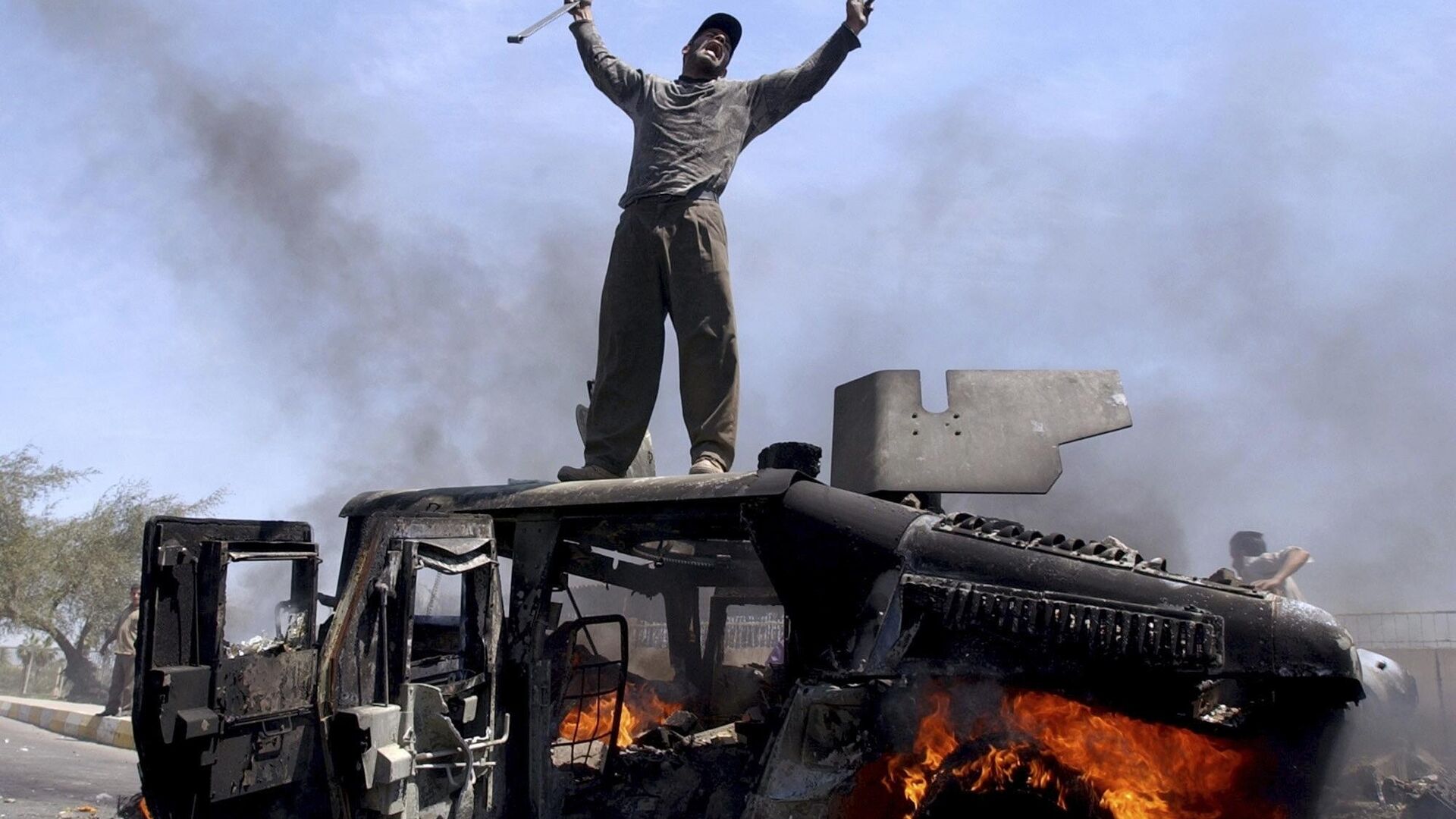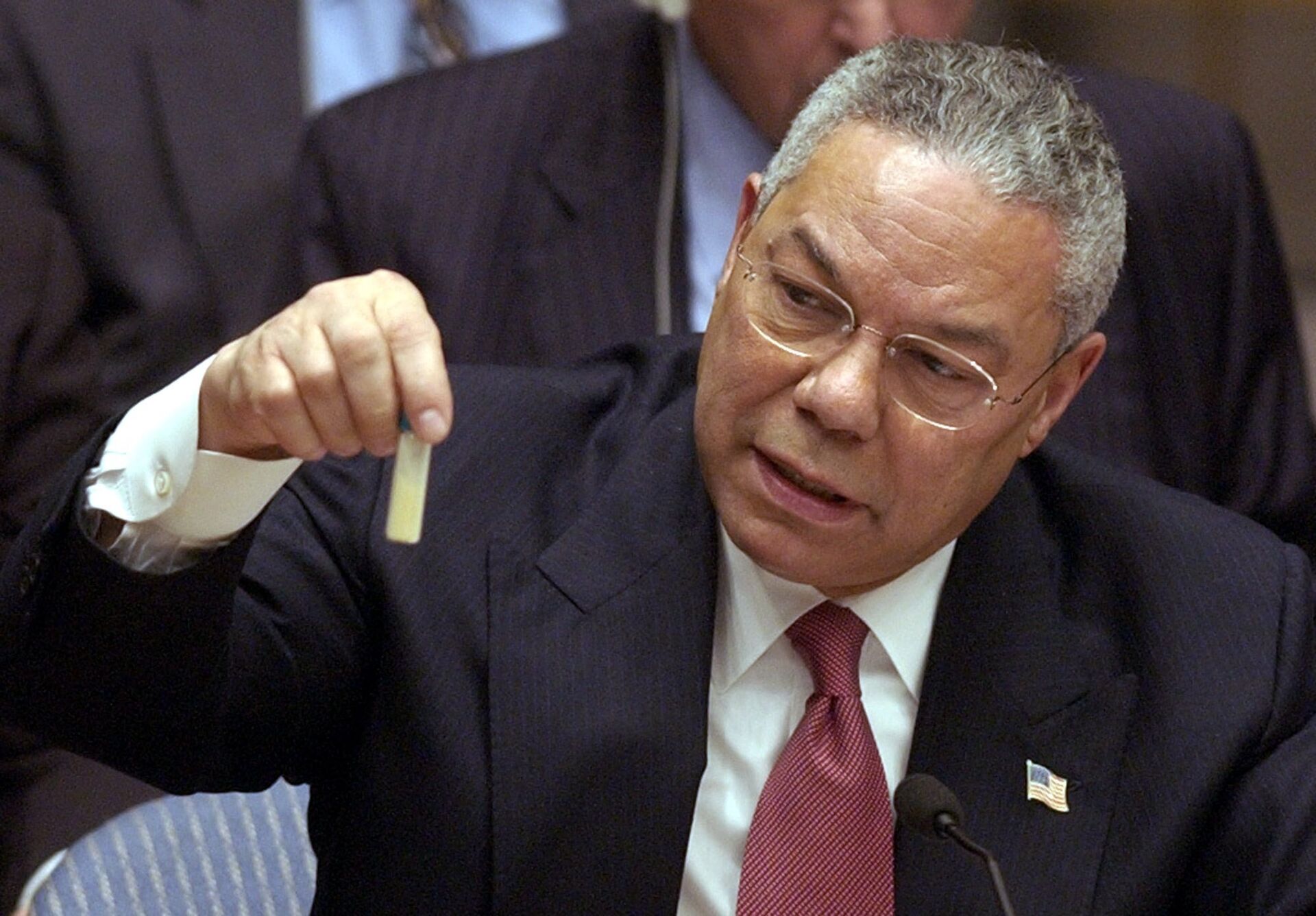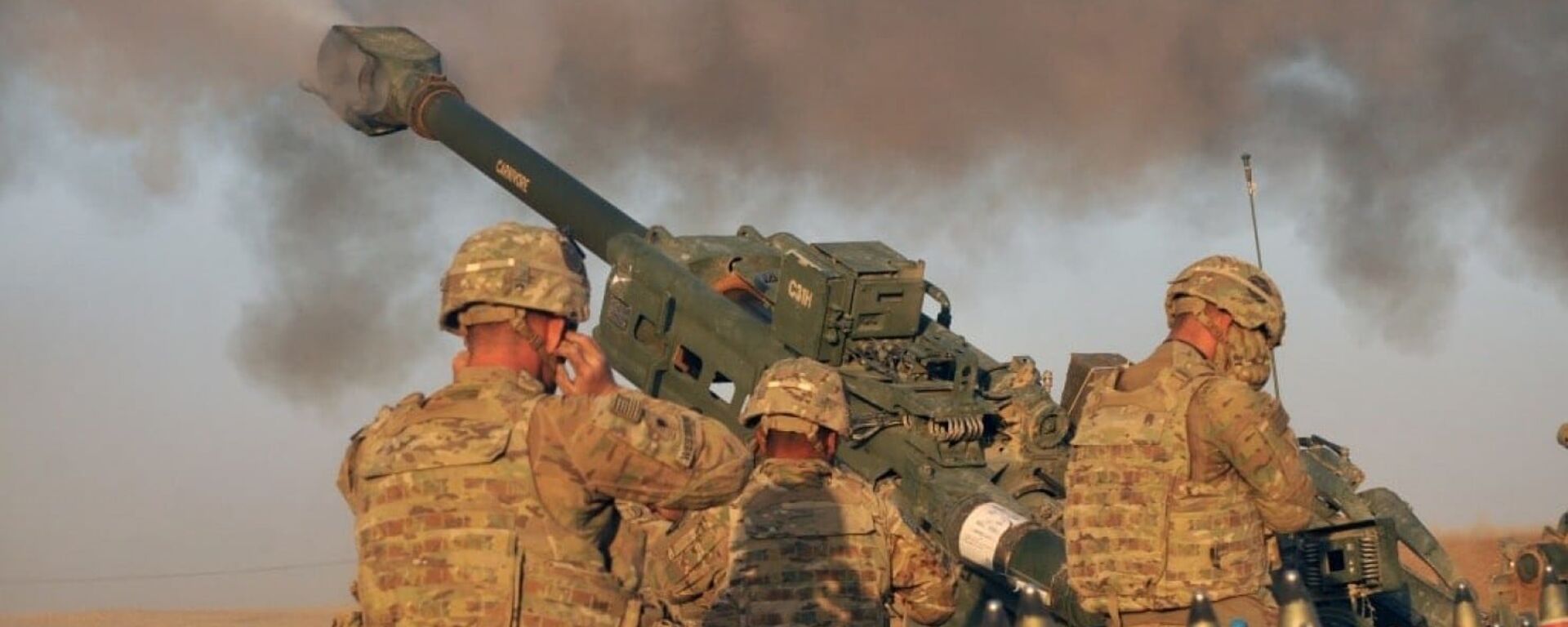https://sputnikglobe.com/20230319/us-nurtured-plans-of-destroying-iraq-years-before-2003-invasion-ex-official-says-1108572318.html
US Nurtured Plans of Destroying Iraq Years Before 2003 Invasion, Ex-Official Says
US Nurtured Plans of Destroying Iraq Years Before 2003 Invasion, Ex-Official Says
Sputnik International
America had nurtured plans of destroying Iraq years before the 2003 invasion, said
2023-03-19T14:53+0000
2023-03-19T14:53+0000
2023-03-19T14:53+0000
20 years since us invasion of iraq
us
iraq
iraq war
2003 invasion of iraq
saddam hussein
george w. bush
tony blair
taliban
https://cdn1.img.sputnikglobe.com/img/07e7/03/13/1108570518_0:94:2001:1219_1920x0_80_0_0_5d0610d6fc4a215d856ce6f58c84b129.jpg
The US was determined to destroy Iraq years before the 2003 invasion, an Iraqi official has told Sputnik.Two decades since the US military entered Baghdad, Farouk Al Fityan, Iraq’s last ambassador to Greece before the US invasion of the country, has shared with Sputnik his recollections of what happened 20 years ago.On February 5, 2003, then-US Secretary of State Colin Powell addressed the United Nations, claiming the United States had ample evidence of Iraq's production of weapons of mass destruction, and demonstrated a vial containing "anthrax" to illustrate the point. However, the so-called proof presented by Washington failed to impress the UN Security Council, which did not authorize the United States to use force. Indeed, by the time of the unauthorized US-led invasion of Iraq, Saddam Hussein had eliminated the country's chemical weapons and other weapons of mass destruction programs. The Bush administration was subsequently revealed to have fabricated evidence of Iraqi WMDs.After the occupation of Afghanistan, it became evident that Iraq was next in line, Farouk Al Fityan said.The US launched its invasion of Afghanistan in October 2001, weeks after the 9/11 terrorist attacks. At the time, the US explained its move by highlighting that Osama bin Laden had masterminded the attacks, and that the Taliban* had offered sanctuary to members of al-Qaeda**. However, the Taliban never recognized the US assertions that the group had any ties to the 2001 attacks. The US invasion went on to claim the lives of thousands of US soldiers, and more than 100,000 Afghan troops, police, as well as civilians caught in the crossfire.Amid the hostility emanating from Washington, Baghdad attempted to consolidate international opinion, and the Iraqi foreign minister at the time, Naji Sabri, serving under then-President Saddam Hussein, was trying to involve a number of Arab countries, especially the Gulf States, in this process, Farouk Al Fityan said. Shuttle diplomacy was undertaken to the United Arab Emirates (UAE), Qatar, and Bahrain… After the Beirut summit in 2002, visits were made to Cairo, Damascus, and Algiers. The Foreign Ministry also reached out to Iran and other neighboring countries, hoping to “break the mechanism of war” conceived by the United States.At the same time, the former Iraqi official said, American President George W. Bush and British Prime Minister Tony Blair had already set the stage for what would follow.When the blockade of Iraq was imposed after the Gulf War (1990–1991), everyone suffered a lot. It was very difficult to get medicine for children, not to mention food. The hardest years were from 1991 to 1995, the Iraqi ex-official said, adding:Subsequently, the Oil-for-Food Program (OIP) was established by the UN in 1995, allowing Iraq to sell oil on the world market in exchange for food, medicine, and other humanitarian necessities. Due to the blockade and false accusations of possession of weapons of mass destruction, Iraq had to deal with multiple international inspection teams. Baghdad opened the doors for the teams, albeit the Foreign Ministry was fully aware of their lack of impartiality.According to Farouk Al Fityan, his country's leadership was convinced that there would be no US offensive, as had happened in Afghanistan. They expected that everything would be limited to some air strikes on some objects, but in fact, "America's decision to destroy Iraq had already been made."*organization under UN sanctions for terrorism.**Al-Qaeda is a terrorist organization banned in Russia and many other countries
https://sputnikglobe.com/20220815/afghanistan-battle-was-lost-from-beginning-built-on-us-desire-to-reshape-world-in-own-image-prof-1099579645.html
https://sputnikglobe.com/20221230/how-saddam-husseins-execution-scarred-iraq-and-changed-us-foreign-policy-forever-1105930776.html
https://sputnikglobe.com/20230319/abu-ghraib-horrors-of-us-occupation-of-iraq-1108563125.html
iraq
Sputnik International
feedback@sputniknews.com
+74956456601
MIA „Rossiya Segodnya“
2023
News
en_EN
Sputnik International
feedback@sputniknews.com
+74956456601
MIA „Rossiya Segodnya“
Sputnik International
feedback@sputniknews.com
+74956456601
MIA „Rossiya Segodnya“
america nurtured plans of destroying iraq, years before 2003 invasion, false premise, leader of iraq saddam hussein, hiding weapons of mass destruction, farouk al fityan, iraq’s last ambassador to greece, ex-director of the office of the foreign ministry of iraq, before the us invasion,
america nurtured plans of destroying iraq, years before 2003 invasion, false premise, leader of iraq saddam hussein, hiding weapons of mass destruction, farouk al fityan, iraq’s last ambassador to greece, ex-director of the office of the foreign ministry of iraq, before the us invasion,
US Nurtured Plans of Destroying Iraq Years Before 2003 Invasion, Ex-Official Says
Based on what turned out to be the false premise that then-leader of Iraq Saddam Hussein was hiding weapons of mass destruction, on March 19, 2003, the US launched its Operation Iraqi Freedom, which cost the lives of over 4,700 US and allied servicemen, and hundreds of thousands, or even millions of Iraqis.
The US was determined to destroy Iraq years before
the 2003 invasion, an Iraqi official has told Sputnik.
Two decades since the US military entered Baghdad, Farouk Al Fityan, Iraq’s last ambassador to Greece before the US invasion of the country, has shared with Sputnik his recollections of what happened 20 years ago.
“We feared an invasion after the events of September 11, 2001, and the subsequent groundless, unrealistic accusations, claiming that Iraq possessed weapons of mass destruction, and had possibly been involved in the 9/11 attack," said the ex-director of the Iraqi foreign minister's office before the US occupation.
On February 5, 2003, then-US Secretary of State
Colin Powell addressed the United Nations, claiming the United States had ample evidence of Iraq's production of weapons of mass destruction, and demonstrated a vial containing "anthrax" to illustrate the point. However, the so-called proof presented by Washington failed to impress the UN Security Council, which did not authorize the United States to use force. Indeed, by the time of the unauthorized US-led invasion of Iraq, Saddam Hussein had eliminated the country's chemical weapons and other weapons of mass destruction programs. The Bush administration was subsequently revealed to have
fabricated evidence of Iraqi WMDs.
After the
occupation of Afghanistan, it became evident that Iraq was next in line, Farouk Al Fityan said.
The US launched its invasion of Afghanistan in October 2001, weeks after the
9/11 terrorist attacks. At the time, the US explained its move by highlighting that Osama bin Laden had masterminded the attacks, and that the Taliban* had offered sanctuary to members of al-Qaeda**. However, the Taliban
never recognized the US assertions that the group had any ties to the 2001 attacks. The US invasion went on to claim the lives of thousands of US soldiers, and more than 100,000 Afghan troops, police, as well as civilians caught in the crossfire.
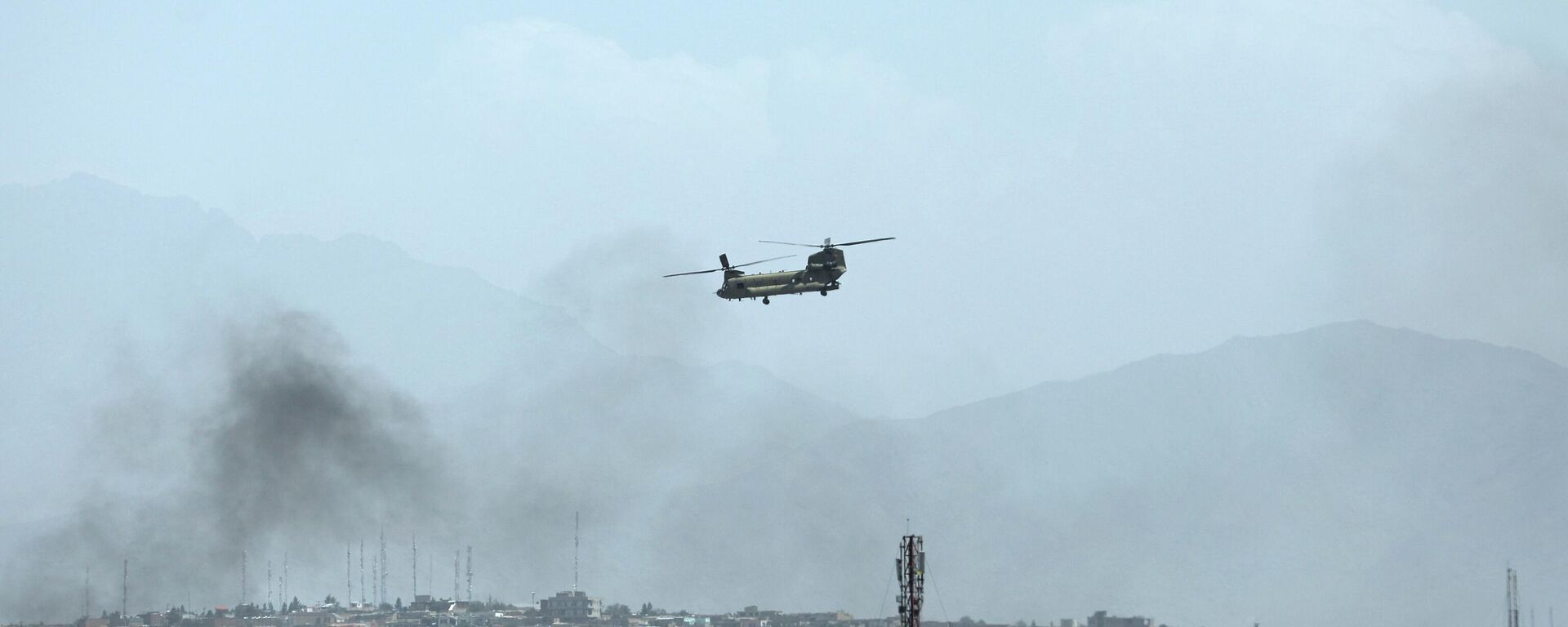
15 August 2022, 07:00 GMT
Amid the hostility emanating from Washington, Baghdad attempted to consolidate international opinion, and the Iraqi foreign minister at the time, Naji Sabri, serving under
then-President Saddam Hussein, was trying to involve a number of Arab countries, especially the Gulf States, in this process, Farouk Al Fityan said.
Shuttle diplomacy was undertaken to the United Arab Emirates (UAE), Qatar, and Bahrain… After the Beirut summit in 2002, visits were made to Cairo, Damascus, and Algiers. The Foreign Ministry also reached out to Iran and other neighboring countries, hoping to “break the mechanism of war” conceived by the United States.
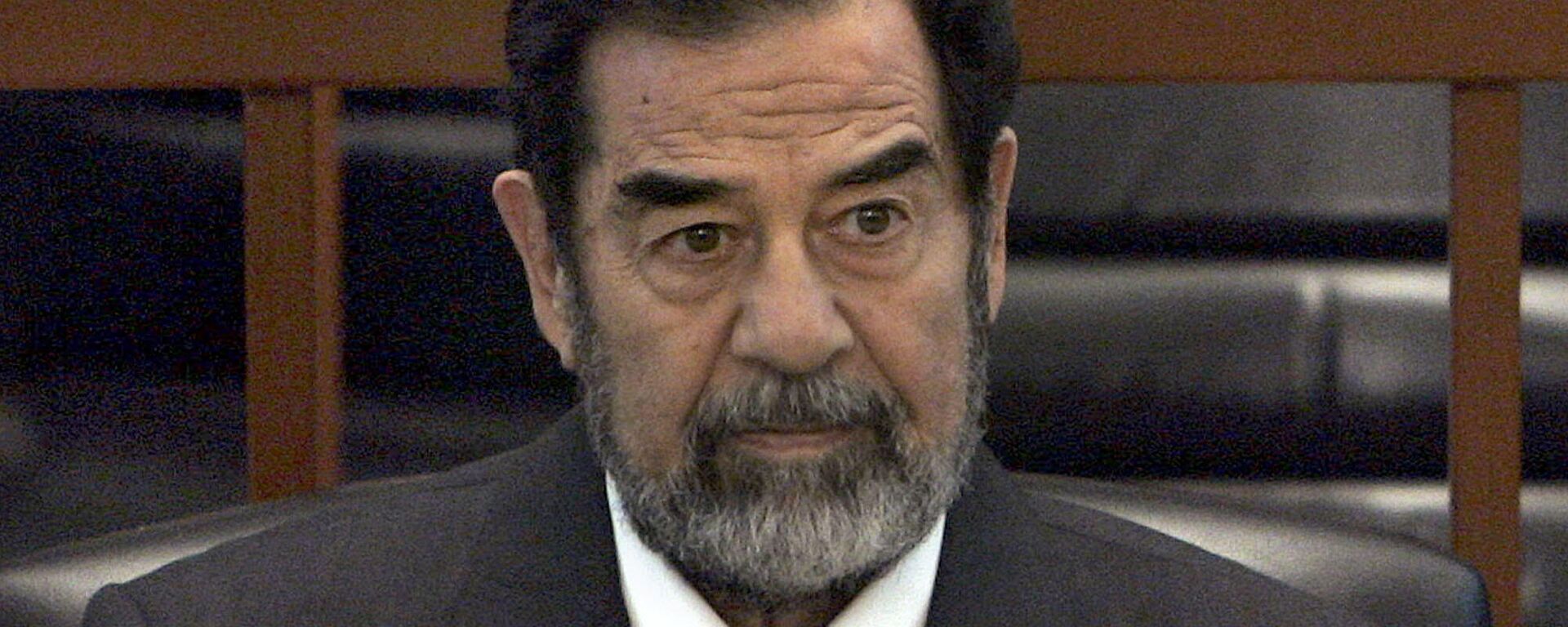
30 December 2022, 16:50 GMT
At the same time, the former Iraqi official said, American President George W. Bush and British Prime Minister Tony Blair had already set the stage for what would follow.
“If we look at the Arab reality today, we will see that the scheme tested in Iraq was later implemented in Libya, Sudan, and Syria. The Arab world was thrust into a difficult situation 20 years ago.”
When the blockade of Iraq was imposed after the
Gulf War (1990–1991), everyone suffered a lot. It was very difficult to get medicine for children, not to mention food. The hardest years were from 1991 to 1995, the Iraqi ex-official said, adding:
"We felt that the US was serious about destroying Iraq, because there had never been an international blockade like the one that was imposed upon us then."
Subsequently, the Oil-for-Food Program (OIP) was established by the UN in 1995, allowing Iraq to sell oil on the world market in exchange for food, medicine, and other humanitarian necessities. Due to the blockade and false accusations of possession of weapons of mass destruction, Iraq had to deal with multiple international inspection teams. Baghdad opened the doors for the teams, albeit the Foreign Ministry was fully aware of their lack of impartiality.
"We knew that they were subordinate to the United States and Great Britain. But Iraq had no choice but to accept. And we, the diplomats and the military, were forced to come to terms with this. However, I was personally convinced that they had come to destroy Iraq, and not to 'remove the threat of war.'"
According to Farouk Al Fityan, his country's leadership was convinced that there would be no US offensive, as had happened in Afghanistan. They expected that everything would be limited to some air strikes on some objects, but in fact, "America's decision to destroy Iraq had already been made."
*organization under UN sanctions for terrorism.
**Al-Qaeda is a terrorist organization banned in Russia and many other countries
